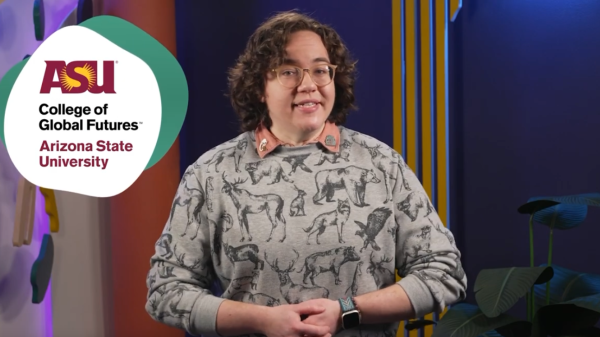Best outdoor experiences are shared and build connections, recreation professor says

ASU School of Community Resources and Development Assistant Clinical Professor Steve Sassaman (far right) leads a recent adventure therapy training group near Haines, Alaska. Courtesy photo
Steve Sassaman doesn’t really need to tell you he’s an outdoorsman. One look at his full, dark beard gives a vibe that clearly says he knows which end of the kayak to put into the water first.
While you’ll often see him at a teaching station or a whiteboard like other professors, Sassaman says the outdoors is his true classroom. Students pursuing careers in parks, recreation or sport management, he said, should know how to do what he does: provide an experience engaging enough to get people outside.
In spring 2025, Sassaman, an assistant clinical professor in his first semester in the Arizona State University School of Community Resources and Development, will be teaching two special topic courses, both labeled PRM 294. One is called Nature-based Activity and Outdoor Recreation Leadership, and the other is Adventures in Risk: Outdoor Safety and Management Strategies.
While the two classes are designed for students pursuing careers in recreation, Sassaman said they also should interest noncareer-path students as well. In fact, for some students who have had little opportunity to explore nature beyond visiting a city park, the courses open the door to a host of new experiences, including how to recognize how the outdoors affect people mentally and relationally.
“They can help you build healthy connections with other students and other people,” he said. “They’re leadership courses.”
Sassaman specializes in creating outdoor adventures within his classes. He has more than 15 years of experience in outdoor education, including residential summer camp management, professional guiding and collegiate recreation program development.
Before coming to ASU, he was assistant director for recreation, outdoor recreation and wellness at Temple University in Philadelphia.
Simply heading into the woods or the desert isn’t all there is to the outdoors, he said. A memorable outdoor experience provides great exercise, but should advance the brain as well as the body.
Getting outdoors is even better when others are involved, Sassaman said.
“The question is, how do we provide an experience to get people outside, engage in group dynamics and to structure some activities that help connect people in a healthy way and engage in introspection?” he said.
No PowerPoints in nature
In the nature-based activity class, Sassaman says he will emphasize group dynamics and teaching in an outdoor environment. It’s challenging to teach outdoors, he said, because there is no PowerPoint on a screen, and no cellphone service to simply look up things that students don’t know.
“You and the students have to adapt to environmental conditions,” he said, calling it a broad departure from simply giving students information.
“The reason I’m passionate about the outdoors is that you’re forced to have that interaction between others. You can’t escape, text, look at your phone, see social media. You have to have discourse with others around you,” he said.
“In society, we often don’t have opportunities for meaningful connection. We often just talk and not have specific goals for the conversation,” Sassaman said. “In that context, outdoor experiences allow us to be flexible and adaptable as educators and not have to drive all this content.”
Sassaman said being a prepared recreation leader today means knowing about more than rendering first aid for the body. It also involves healing the mind.
Learn to be a ‘behavioral first responder’
Toward that goal, the nature-based activity course also offers a new certification called “behavioral first responder.” People learning in the outdoors, many for the first time, often aren’t prepared for what they might feel there, he said.
Such “first responders” have skills to help individuals work through any related anxiety they may be feeling and enable them to more fully enjoy the outdoor experience, Sassaman said.
“We often don’t have major medical issues in the wilderness, but we are outside our comfort zone to be vulnerable in the outdoors,” Sassaman said. “This can mean new experiences such as going to the bathroom in the dark in the wilderness, feeling fear about that.”
For example, a student who grew up with little connection to family and friends might feel apprehensive about eating meals with others outdoors, Sassaman said.
Finding how taking risks can be of benefit
Taking risks can be beneficial if students can learn how to break through barriers and promote healthy outdoor recreation, Sassaman said.
The risk course includes a three-day backpacking trip that students will help plan. The experience will include sharing time and conversation with minimal technology. Additionally, the course will include qualifying for the Leave No Trace Level 1 Certification, which prepares students to facilitate one-day programs focused on environmental stewardship in the context of recreation.
The School of Community Resources and Development is part of the Watts College of Public Service and Community Solutions.
More Environment and sustainability

Floods linked to rise in US deaths from several major causes
New research, co-authored by Arizona State University Assistant Professor Aaron Flores and published in Nature Medicine, uncovers a concerning link between severe flooding and increased…

ASU partners with education production company to share research with online learners
Through Arizona State University’s partnership with Complexly education production company, the online educational initiative Study Hall has forged a new pathway for students to earn college credits…

First-year students get immersive cultural, sustainability lessons in Costa Rica
Studying abroad can be a life-changing experience for any student, let alone a new student who just completed their first semester in college.That's what more than 50 Arizona State University…